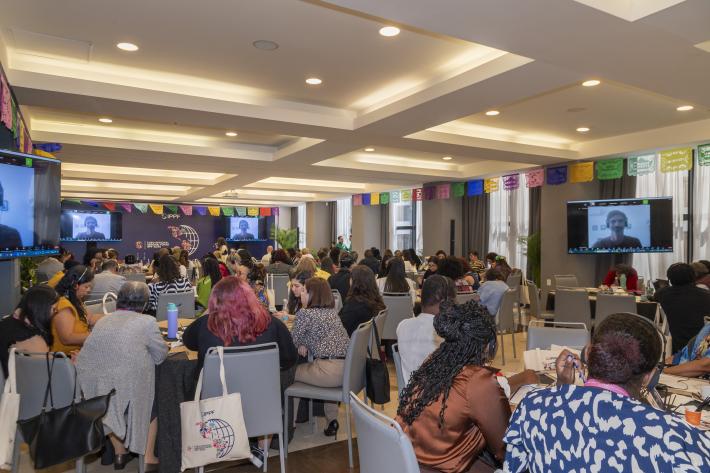Latest press releases
A selection of stories from across the Federation
Americas & the Caribbean
Breaking: IPPF Global Research Exposes Devastating Impact of the Trump Administration
Over Half of Partners and $85 Million Affected
For media enquiries


| 24 July 2024
IPPF ACRO and FPA celebrate historic decision for LGBTQI+ people in Aruba and Curaçao!
Haz click aquí para leer esta historia en español. On July 12th, the Dutch Supreme Court validated same sex marriage in Aruba, Curaçao, and St. Maarten, emphasizing that prohibiting same-sex marriage violates the constitutional ban on discrimination. The court’s decision upholds a ruling from September 2021, which had been challenged by both countries. IPPF ACRO and FPA urge the governments of Aruba and Curaçao to promptly comply with the Supreme Court's decision as it is a matter of fundamental rights. Ensuring adherence to this ruling is essential for the protection and equality of the LGBTQI+ community. Coming after Aruba’s parliament rejected the marriage equality bill almost a month ago, this ruling continues a trend in the region to legalize and protect LGBTQI+ populations. FPA and Famia Plania, IPPF Members in Aruba and Curaçao, has for decades advocated and supported efforts towards LGBTQI+ equality, with quality sexual and reproductive health services provision as well as community articulation. “This positive outcome is a major step towards visibility, rights and access to health, such as sexual and reproductive services for all LGBTQI+ people in the Dutch Caribbean. At FPA, we are deeply committed towards inclusion, and as we celebrate this ruling, we will continue using our voices to advocate for social change,” states Evelyn Yarzagaray, Executive Director of FPA, IPPF Member Association in Aruba.

| 17 May 2024
INPPARES and IPPF's position on Peru's Supreme Decree Nº 009-2024-SA
All LGBTQI+ people in Peru and in the Americas and the Caribbean have the right to lives free from violence! In recent months, IPPF ACRO Member Associations, Collaborating Partners and the IPPF ACRO Secretariat have witnessed how some governments in the Americas and the Caribbean, even some that have historically acted to protect and advance human rights, have become the main opponents of people's rights, freedom and self-determination. So, after writing about our concerns about the new Argentinean government, today, on the International Day Against LGBTIQ+-Phobia, we want to demonstrate our strong concern with the actions of the government of Peru, which undermine the fundamental rights of LGBTIQ+ people. The IPPF Americas and Caribbean Regional Office joins INPPARES, Member Association in Peru, in expressing its rejection of the Supreme Decree Nº 009-2024-SA issued last May 10th by the Peruvian Ministry of Health which, by updating the Essential Health Insurance Plan (PEAS) based on the 10th revision of the International Classification of Diseases (ICD-10), violates the human rights of LGBTIQ+ people. Some context: The PEAS contains the list of interventions that can be addressed by health insurers in Peru, so it is vitally important that it is kept up to date with the guidelines and standards set by the World Health Organisation (WHO). From time to time, the WHO revises its International Classification of Diseases (ICD) to update it based on recent scientific evidence and thus adequately guide global clinical practice. Recall that in 2019, the 11th revision of the ICD made history by removing trans identities and expressions from the chapter on ‘Mental and Behavioural Disorders’. However, last week, the government of Peru decided to use an outdated revision of the ICD, which pathologises sexual orientation and gender identity. This decision of the Peruvian government to use ICD-10 is very serious, as it violates binding codes and agreements at local, regional and international level. On the one hand, it violates the constitutional right to health established in articles 7 and 9 of the Political Constitution of Peru, which establishes the right to health on the basis of equality and non-discrimination. Furthermore, it disregards the information, guidelines and standards of the WHO, the United Nations specialised health agency, and the requests of the Office of the UN High Commissioner since 2015 to stop the pathologisation of LGBTIQ+ people, in particular trans and intersex people. It also goes against commitments adopted by Peru in numerous regional and international declarations, such as the Montevideo Consensus, whose implementation and follow-up was officially adopted in 2016 by Supreme Decree N° 051-2016-PCM. Today, it is necessary to reaffirm that LGBTIQ+ people have the right to live free from violence, to live their gender identity and sexual orientation freely, to access health and reproductive services where their identities are respected and their specific needs are met. It is the responsibility of governments to ensure that these rights are fulfilled.
















